Te Pua Wānanga ki te Ao Māori and Indigenous Studies staff include leading researchers in issues pertaining to Māori and Pacific Development, indigenous studies and culture and language revitalisation. Through our research we provide national and international leadership in Māori, Pacific and indigenous issues and sustainable development.
Puna for Māori & Indigenous Research
The strategic goal of the Puna for Māori & Indigenous Research is to become a centre of research excellence capable of fostering and facilitating the self-determination, self-governance and development efforts of indigenous peoples in New Zealand, Australia, and Pacific rim countries generally.
Its research and development activities are supported through research scholarships and the provision of opportunities for emerging scholars to conduct doctoral and post-doctoral research. The Puna continues to form strategic alliances with relevant research institutions both here and overseas. It also provides an advisory service, and assists in the dissemination and publication of research and development findings. The Puna facilitates academic exchanges, conferences, hui, seminars and convocations.
Staff and students of the Faculty of Māori and Indigenous Studies engage in theoretical and applied research in the core disciplines and inter-disciplinary fields that constitute their primary academic focus. That research is aligned with the government's national goals and is designed to meet the needs and aspirations of those local, national and international communities with which the Faculty identifies in its mission, vision and strategic planning goals and with whose members it maintains an ongoing collaborative relationship. Our research and teaching are integrated and both are designed to contribute to theory, practice, and public policy in New Zealand and around the globe.
Ngā Kaupapa o Te Wā | Current Research Projects
Working to End Racial Oppression: WERO
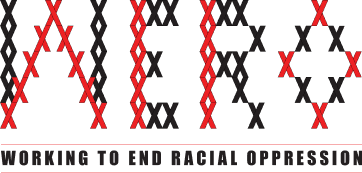 WERO means to provoke, agitate and inspire. Our researchers actively take up the challenge of confronting institutional and interpersonal racism in Aotearoa.
WERO means to provoke, agitate and inspire. Our researchers actively take up the challenge of confronting institutional and interpersonal racism in Aotearoa.
Racism represents one of the most significant challenges facing Aotearoa. The effects of racism are extensive, manifesting in everyday forms of discrimination for Māori, Pacific peoples and minoritised ethnic communities. Entrenched in systems and structures that create disadvantage for minorities, and advantage for privileged ethnic majorities, racism is evident in inequitable outcomes across almost every indicator of wellbeing, including those within health, education, housing, employment and justice.
- Science-Lead: Professor Waikaremoana Waitoki
- Funded with a grant of $10 million over five years (2020-2025) through the Ministry of Business and Innovation Endevour Fund (MBIE)
- WERO on Research Commons
- Learn more about Our People at WERO
Spiritual Care in Aotearoa Health Care
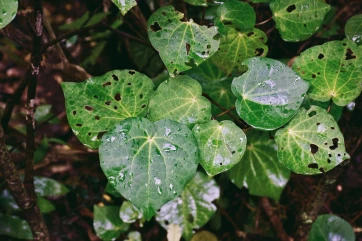 Kawakawa
Kawakawa
The purpose of Spiritual Care in Aotearoa Health Care research project is to support the transformation of healthcare within Aotearoa New Zealand into a system that recognises the wairua and spiritual dimensions of wellbeing, ensuring inclusive, equitable, holistic and culturally safe health journeys for all.
- Researchers: Co-Led by Professor Moana Waitoki, Professor Richard Egan
- Research Fellows: Dr Raima Hippolite, Mei-Ling Blank
- The Spiritual Care in Aotearoa Health Care project received $1.3 million for 36 months from the Health Research Council (2023-2026)
- Read more about the Spiritual Care in Aotearoa Health Care Team
Pou Rāhui, pou tikanga, pou oranga: reigniting the mauri of Tīkapa Moana and Te Moananui-ā-Toi
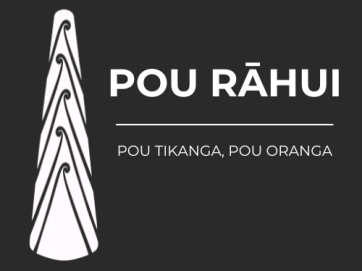 Lead Investigator Professor Kura Paul-Burke will co-develop pragmatic restoration actions for identified marine taonga species within rāhui areas of five iwi (Ngāti Pāoa, Ngāti Tamaterā, Ngāi Tai ki Tāmaki, Ngāti Hei and Ngāti Rehua Ngāti Wai).
Lead Investigator Professor Kura Paul-Burke will co-develop pragmatic restoration actions for identified marine taonga species within rāhui areas of five iwi (Ngāti Pāoa, Ngāti Tamaterā, Ngāi Tai ki Tāmaki, Ngāti Hei and Ngāti Rehua Ngāti Wai).
The Pou Rāhui, pou tikanga, pou oranga project will collaborate with iwi to investigate and share localised knowledge based on a mātauranga Māori approach, supporting a deeper understanding of rāhui and existing mātauranga in a contemporary context alongside modern scientific tools.
Pou Rāhui, pou tikanga, pou oranga also aims to develop capability within the iwi for assessing the need for and implementing and managing rāhui, creating a space for new iwi-led, mātauranga and science-based decision-making and management/restoration of coastal ecosystems.
- Lead Investigator: Professor Kura Paul-Burke
- The Pou Rāhui, pou tikanga, pou oranga project received a grant of $13 million in 2022 from the Ministry of Business, Innovation and Employment Endeavour Fund (MBIE)
- Learn more about the Pou Rāhui, pou tikanga, pou oranga project.
Kai Piro, Oranga Tangata: Māori Fermented Food and Derived Health Benefits to Māori
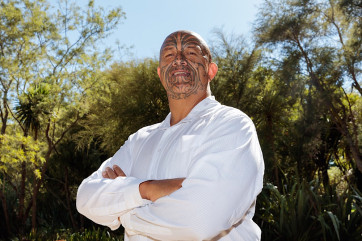
Professor Te Kahautu Maxwell
Kai piro was traditionally a staple component of the Māori diet. However, over time and due to post-european contact, the practice of sourcing, processing, and consumption of kai piro has lessened to the degree in which it is no longer part of the common Māori diet today. The practice of kai piro is maintained today by remnants of an ageing Māori population.
The objectives of the Kai Piro, Oranga Tangata: Māori Fermented Food and Derived Health Benefits to Māori project are to record the practices, lived experiences and narratives of the few practioners and knowledge-holders, and their belief in the health benefits derived from kai piro. The aim is to retain this mātauranga for future generations, with the intention to revitalise these traditional practices, in the hope that kai piro will once again become a staple component in the Māori diet of future generations.
-
Professor Te Kahautu Maxwell supervising Daniel Poihipi
-
Funded $50,0000 from Ngā Pae o te Māramatanga 2022-2024
Te Rā: The Māori Sail | Whakaarahia anō te rā kaihau! – Raise up the billowing sail!
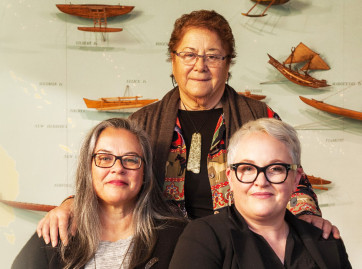
Associate Professor Donna Campbell, Rānui Ngārimu and Dr Catherine Smith
Te Rā is the sole remaining customary Māori sail. She is held in the British Museum and has never been systematically studied or documented. Te Rā’s existence is evidence of the relationship of Māori to Polynesian antecedents and speaks to the centrality of voyaging in Māori tradition.
The Te Rā: The Māori Sail | Whakaarahia anō te rā kaihau! research project aims to revitalise the cultural knowledge contained in Te Rā. Recovering this knowledge will involve an interdisciplinary approach and the use of a diverse range of methods in order to access previously unknown information related to cultural knowledge, use, construction and technology.
- Co-led by Associate Professor Donna Campbell
- The Te Rā: The Māori Sail | Whakaarahia anō te rā kaihau! research project is a Royal Society – Te Apārangi Marsden fund project.
The embrace of our ancestors: re-imagining and recontextualising mātauranga Māori in psychology
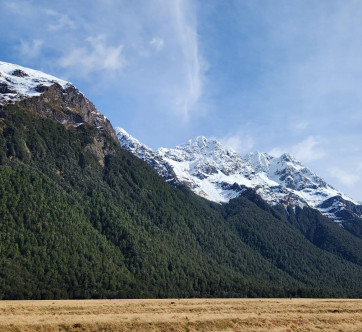
Te Anau
The growing presence of mātauranga Māori (Māori knowledge) in psychology represents a trend to resist the dominance of Western psychology as a universal paradigm of wellbeing for Māori.
This research will explore the contributions of Māori knowledge to growing an Indigenous psychology that will produce new, empirical theories, cohere fragmented knowledge, decolonise psychology and enhance transdisciplinary collaborations. Using a kaupapa Māori theoretical lens, we will consider and debate the wealth of interrelated knowledge about whānau, creative arts, the environment, and spirituality that hover in places invisible to Western psychology.
We will examine the repositories of Māori traditional knowledge held in archives, museums, and marae, to uncover wellbeing narratives of the past. Linkages to the present will be revealed by using the Critical Incident Technique, which offers a flexible, open-ended, enquiry tool to mediate collaborative conversations with 100 psychologists, counsellors, psychiatrists, elders and healers. The exemplars gained from these conversations will be debated and critiqued at knowledge exchange symposia.
The research findings will contribute to a textbook on the theory of Māori Indigenous psychology; peer-reviewed journal articles, and importantly reclamation of Māori-defined solutions for those seeking wellness.
Kaumātua Mana Motuhake Pōi
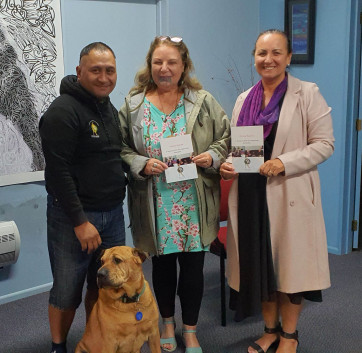
Professor Sophie Nock (far right)
Ageing is part of life, and kaumātua see it as a positive development as it means that you are held in high esteem by the community. Rather than kaumātua ‘retiring’, they enter into another phase of life that can have significant cultural, hapū and iwi expectations and commitments.
The phase 2 research programme, Kaumātua Mana Motuhake Pōi (colloquially known as KMM Pōī), is studying further the tuakana-teina (older sibling-younger sibling) peer intervention model, in addition to an intergenerational model for increasing physical activity and cultural knowledge exchange.
- Professor Sophie Nock
- Funded $2.5M by Ageing Well – National Science Challenge
Tuupuna Times Training Project (Karitāne) for Chatham Islands Kaitiaki
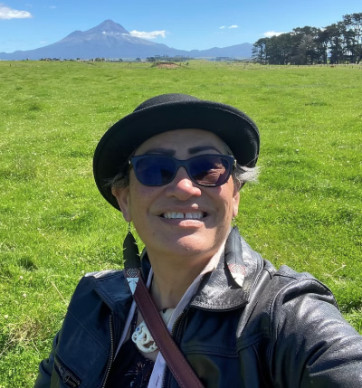
Professor Tangiwai Rewi
E rua ngā aronga o te hōtaka rangahau nei hei tiaki āwhina i te iwi ki te āta tiaki, manaaki i te taiao : Ko te tuatahi ko te whakaako ki ngā Kaitiaki me pēwhea te uiui me te hopu i a rātou ake pūrākau/kōrero e hāngai ana ki tō rātou ao -te nohoanga ki tātahi. Ko te aronga tuarua ko te whakaako ki ngā Kaitaiaki me pēwhea te kohi me te aro mātai i ngā raraunga e mōhio ai rātou ki te tōnui o ngā momo kai ki ngā wāhi kua tāutungia kētia ki ētahi takiwā. Mā reira, ka āhei te iwi ki te whakarite rautaki hei tiaki i te taiao.
- Professor Tangiwai Rewi
- Funded $50,000 by Coastal People: Southern Skies
Big Data Insights into Treaty Principles Bill Submissions
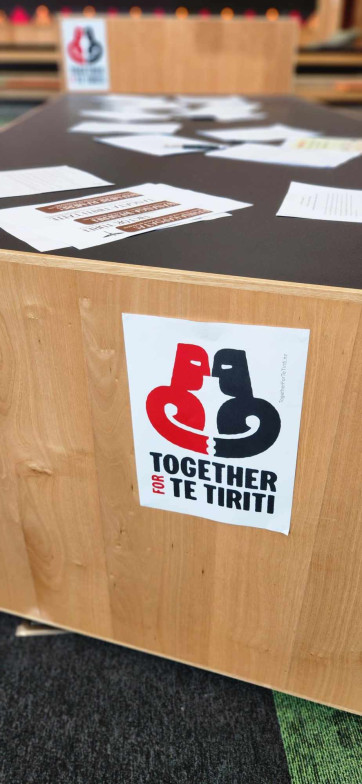
Treaty Principles Bill submission workshop
The ACT Party introduced the Treaty Principles Bill in 2024, proclaiming to protect everyone’s equal rights before the law. The Bill has sparked immense debates over the Crown’s attempt to rewrite the articles of te Tiriti o Waitangi and undermine Māori tino rangatiratanga. It has drawn tangata whenua and tangata Tiriti together to participate in Hīkoi mō te Tiriti and write submissions to vehemently oppose the Bill.
Although the Justice Select Committee members have commenced preliminary analyses of the 300,000 submissions, they have missed significant opportunities to centre Māori aspirations and adequately honour this record-level public input on te Tiriti.
This study seeks to identify the operation of racism in the discussion of Māori and te Tiriti, and solutions to these. To do this, a multi-method analysis of the submissions will be conducted, involving:
- large language model analyses to identify recurring themes
- theory-driven analyses on the intersection of racism and problematic reasoning; and
- counter-storytelling to amplify responses to racist rhetoric.
Student success
Mana Wahine Perspectives for Waka Ama and Hauora

Kay Berryman (right)
The purpose of this research is to investigate the perspectives and experiences of a total of twenty Māori women (10) and Indigenous women (10) waka ama paddlers about Mātauranga/Indigenous Knowledge (Mātauranga/IK).
It aims to explore the impact of waka ama on the overall Hauora (well-being) of these women and examine the cultural, social, political, and environmental factors that contribute to the perceived benefits of waka ama within their communities.
Additionally, the research seeks to identify opportunities for integrating and enriching Mātauranga Māori/IK within the context of waka ama, promoting the revitalisation and relevance of traditional knowledge systems.
The research will be guided by Kaupapa Māori principles, ensuring a culturally grounded and respectful approach that empowers participants and is mana-enhancing.
- Professor Sophie Nock supervising Kay Berryman
- This research project was funded $123,600.00 for 36 months from the Health Research Council.
Te whakahaumanu i ngā taonga takatāpui – Belonging and thrivance for takatāpui
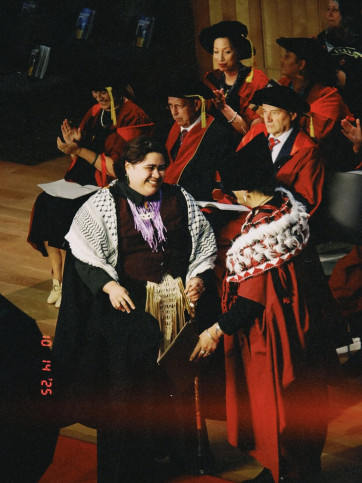
Te Aorere Ngātai-Tautuku (left)
This research aims to celebrate takatāpui identities through pūrākau from tāngata takatāpui who create and/or facilitate spaces of belonging as a form of resistance against settler colonialism. Tāngata takatāpui should have tino rangatiratanga – the fundamental right to self-determination and be protected as a guaranteed right of Te Tiriti o Waitangi.
The purpose of this research seeks to contribute to the field of evolving and maintaining proficiency in building social cohesion, fostering inclusion and preventing and resisting violent extremism.
- Associate Professor Donna Campbell supervising Te Aorere Ngātai-Tautuku
- This project was funded $15,000 for 12 months from He Whenua Taurikura – a Land at Peace
Student Summer Scholars
- 2022/3 Summer scholar Sophia Wairoa-Harrison’s article Māori-focused Course Content in Undergraduate Psychology Programmes in Aotearoa New Zealand was published in the New Zealand Journal of Psychology with her supervisors Professor Moana Waitoki and Dr Kyle Tan.
- 2023/4 Summer scholar Svanté Johansson’s article Anti-racism Allyship Amongst Psychologists and Students in Psychology Training in Aotearoa New Zealand was published in Journal of the New Zealand College of Clinical Psychologists in collaboration with his supervisors Dr Kyle Tan and Professor Moana Waitoki.
- 2024/5 Summer scholar Paolo Aquino was awarded the 'Best Poster Award' for his study Kasayayan at mga salaysay: A bibliography of research with Asian communities in Aotearoa (2000-2024) with his supervisor Dr Kyle Tan at the 2025 Asian Academics in Aotearoa Association symposium at AUT.
Pūranga
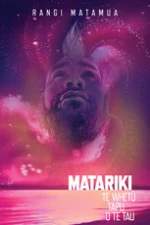 Researchers: Rangi Matamua
Researchers: Rangi Matamua
ISBN: 9781775503262
Keywords: Matariki, Māori, Astronomy
Output Summary
In mid-winter, Matariki rises in the pre-dawn sky, and its observation is celebrated with incantations on hilltops at dawn, balls, exhibitions, dinners and a vast number of events. The Matariki tradition has been re-established, and its regeneration coincides with a growing interest in Māori astronomy. Still, there remain some unanswered questions about how Matariki was traditionally observed. These include:
- What is Matariki?
- Why did Māori observe Matariki?
- How did Māori traditionally celebrate Matariki?
- When and how should Matariki be celebrated?
Based on research and interviews with Māori experts, this book seeks answers to these questions and explores what Matariki was in a traditional sense so it can be understood and celebrated in our modern society.
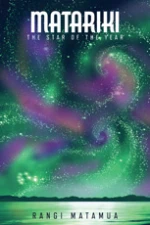 Researchers: Rangi Matamua
Researchers: Rangi Matamua
ISBN: 9781775503255
Keywords: Matariki, Māori, Astronomy
Output summary
In mid-winter, Matariki rises in the pre-dawn sky, and its observation is celebrated with incantations on hilltops at dawn, balls, exhibitions, dinners and a vast number of events. The Matariki tradition has been re-established, and its regeneration coincides with a growing interest in Māori astronomy. Still, there remain some unanswered questions about how Matariki was traditionally observed. These include:
- What is Matariki?
- Why did Māori observe Matariki?
- How did Māori traditionally celebrate Matariki?
- When and how should Matariki be celebrated?
Based on research and interviews with Māori experts, this book seeks answers to these questions and explores what Matariki was in a traditional sense so it can be understood and celebrated in our modern society.
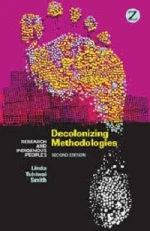 Researchers: Professor Linda Smith
Researchers: Professor Linda Smith
Publisher: Zed Books (2012)
ISBN: 1848139500
Keywords: Imperialism, Colonialism, Hegemony, Indigenous Peoples, Resistance, Emancipation, Research, Methodology, Epistemology, Decolonization, Critical Theory, Postcolonialism, Regimes of Truth.
Output Summary
From the vantage point of the colonized, the term 'research' is inextricably linked with European colonialism; the ways in which scientific research has been implicated in the worst excesses of imperialism remains a powerful remembered history for many of the world's colonized peoples. Here, an indigenous researcher issues a clarion call for the decolonization of research methods.
The book is divided into two parts. In the first, the author critically examines the historical and philosophical base of Western research. Extending the work of Foucault, she explores the intersections of imperialism, knowledge and research, and the different ways in which imperialism is embedded in disciplines of knowledge and methodologies as 'regimes of truth'. Providing a history of knowledge from the Enlightenment to Postcoloniality, she also discusses the fate of concepts such as 'discovery, 'claiming' and 'naming' through which the west has incorporated and continues to incorporate the indigenous world within its own web.
The second part of the book meets the urgent need for people who are carrying out their own research projects, for literature which validates their frustrations in dealing with various western paradigms, academic traditions and methodologies, which continue to position the indigenous as 'Other'. In setting an agenda for planning and implementing indigenous research, the author shows how such programmes are part of the wider project of reclaiming control over indigenous ways of knowing and being.
Exploring the broad range of issues which have confronted, and continue to confront, indigenous peoples, in their encounters with western knowledge, this book also sets a standard for truly emancipatory research. It brilliantly demonstrates that 'when indigenous peoples become the researchers and not merely the researched, the activity of research is transformed.'
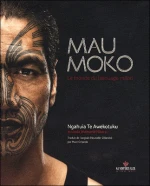 Researchers: Ngāhuia Te Awekotuku
Researchers: Ngāhuia Te Awekotuku
Publisher: Penguin (2011)
ISBN: 9780143566854
Keywords: Moko, tattoo, body art, spirituality, tradition, tikanga, identity, cultural revival
Output Summary
Taia o moko, hei hoa matenga mou . . .
Take your moko, as a friend forever . . .
In the traditional Māori world the moko, or facial or body tattoo, was part of everyday life; everyone had some patterning on their skin. Men wore elaborate designs on their faces; women's were usually less complex but elegant, and both sexes had extensive body work.
After almost dying out in the twentieth century, Māori skin art is now experiencing a powerful revival, with many young urban Māori displaying the moko as a spectacular gesture of ethnic pride and identity.
This hugely popular and magnificently illustrated book, compiled by a group of Māori scholars from the University of Waikato, is the closest there has ever been to a 'complete' book on moko. Mau Moko examines the use of moko by traditional Māori, notes historical material including manuscripts and unpublished, aural sources, and links the art to the present day. It explores the cultural and spiritual issues surrounding moko and relates dozens of stories, many of them powerful and heart-warming, from wearers and artists.
Mau Moko is superbly enhanced by images from early European encounters, traditional Māori representations, and new colour photography commissioned for the book by Becky Nunes.
Tirohia, he moko!
Look, and wonder, at the beauty of this art form . . .
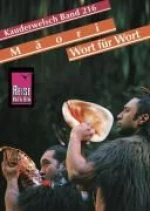 Researchers:
Researchers:
Publisher: Reise (2008)
ISBN: 9783894163259
Keywords: Dictionary, Māori, German, Idiom, Phrases, Translation.